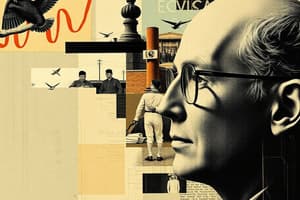Podcast
Questions and Answers
What does the 'invisible hand' concept in Classical Economics represent?
What does the 'invisible hand' concept in Classical Economics represent?
It represents the idea that individuals' pursuit of self-interest leads to positive social outcomes and market efficiency.
How does Keynesian Economics propose to manage economic cycles?
How does Keynesian Economics propose to manage economic cycles?
It advocates for government intervention through fiscal policies, particularly government spending and taxation to influence aggregate demand.
What is a key assumption made by Neoclassical Economics regarding market participants?
What is a key assumption made by Neoclassical Economics regarding market participants?
It assumes that all market participants have perfect information and act rationally to maximize their utility.
In Monetarism, what is identified as the primary cause of inflation?
In Monetarism, what is identified as the primary cause of inflation?
What key idea does Supply-Side Economics emphasize for promoting economic growth?
What key idea does Supply-Side Economics emphasize for promoting economic growth?
What does Behavioral Economics challenge about traditional economic theories?
What does Behavioral Economics challenge about traditional economic theories?
What is one of the main focuses of Institutional Economics?
What is one of the main focuses of Institutional Economics?
What is a fundamental critique offered by Austrian Economics regarding government intervention?
What is a fundamental critique offered by Austrian Economics regarding government intervention?
What are the key areas of focus in Development Economics?
What are the key areas of focus in Development Economics?
How does Environmental Economics relate economic development to sustainability?
How does Environmental Economics relate economic development to sustainability?
What central critique does Marxian Economics offer regarding capitalism?
What central critique does Marxian Economics offer regarding capitalism?
What role does endogenous growth theory play in New Economic Theories?
What role does endogenous growth theory play in New Economic Theories?
What significance does international aid have in Development Economics?
What significance does international aid have in Development Economics?
How do modern developments like globalization influence economic theories?
How do modern developments like globalization influence economic theories?
Flashcards are hidden until you start studying
Study Notes
Economic Theories
1. Classical Economics
- Founded by Adam Smith in the 18th century.
- Emphasizes free markets, competition, and limited government intervention.
- Key concepts include the "invisible hand," supply and demand, and the idea that markets naturally adjust to changes.
2. Keynesian Economics
- Developed by John Maynard Keynes during the Great Depression.
- Argues that aggregate demand drives economic growth and employment.
- Advocates for government intervention, particularly fiscal policy (government spending and tax policies) to manage economic cycles.
3. Neoclassical Economics
- Builds on classical economics with a focus on consumer choice and utility maximization.
- Incorporates mathematical models to analyze economic behavior.
- Assumes perfect information and rational actors in the market.
4. Monetarism
- Associated with economist Milton Friedman.
- Emphasizes the role of governments in controlling the amount of money in circulation.
- Argues that inflation is a result of excessive growth in the money supply.
5. Supply-Side Economics
- Focuses on boosting economic growth by increasing the supply of goods and services.
- Advocates for lower taxes and deregulation to encourage production and investment.
- Popularized in the 1980s, particularly during Reagan's presidency.
6. Behavioral Economics
- Integrates psychology with economic theory.
- Studies how psychological factors affect economic decision-making.
- Challenges the assumption of rational agents by examining biases and heuristics.
7. Institutional Economics
- Emphasizes the role of institutions (laws, regulations, norms) in shaping economic behavior.
- Examines how institutions evolve and influence economic performance.
- Key figures include Douglass North and Ronald Coase.
8. Austrian Economics
- Founded by economists such as Carl Menger and Ludwig von Mises.
- Critiques government intervention and central planning.
- Focuses on individual actions, subjective value, and the importance of market processes.
9. Development Economics
- Studies economic development in low-income countries.
- Focuses on poverty alleviation, education, health, and infrastructure.
- Examines the roles of international aid, trade, and investment.
10. Environmental Economics
- Analyzes the economic impacts of environmental policies.
- Studies the trade-offs between economic development and environmental sustainability.
- Advocates for market-based solutions to environmental issues, such as carbon pricing.
11. Marxian Economics
- Based on the works of Karl Marx.
- Critiques capitalism and explores the dynamics of class struggle and capital accumulation.
- Focuses on labor value, exploitation, and the inherent contradictions of capitalism.
12. New Economic Theories
- Includes modern developments like endogenous growth theory, which emphasizes technological innovation as a driver of growth.
- Explores the role of information technology and globalization in shaping economic dynamics.
Conclusion
- Economic theories provide frameworks for understanding and analyzing various aspects of economies.
- Each theory offers distinct perspectives on how economies function and the role of government, individuals, and institutions.
Classical Economics
- Founded by Adam Smith in the 18th century; centers on free markets and limited government intervention.
- Introduces key concepts like the "invisible hand," which describes self-regulating nature of markets through supply and demand.
- Suggests that markets automatically adjust to changes without the need for external interference.
Keynesian Economics
- Developed by John Maynard Keynes during the Great Depression; emphasizes aggregate demand as the key driver of economic growth and employment.
- Advocates for active government intervention using fiscal policies, such as strategic government spending and tax adjustments, to manage economic fluctuations.
Neoclassical Economics
- Advances classical economics by focusing on consumer choice and the maximization of utility.
- Utilizes mathematical models to analyze economic behavior, assuming that market participants operate with perfect information and rationality.
Monetarism
- Associated with Milton Friedman; underscores the importance of controlling the money supply to regulate the economy.
- Argues that inflation is primarily caused by excessive growth in the money supply rather than other economic factors.
Supply-Side Economics
- Aims to stimulate economic growth through an increase in the supply of goods and services.
- Promotes policies such as tax reduction and deregulation to encourage production and investment, gaining popularity in the 1980s during Reagan’s presidency.
Behavioral Economics
- Merges psychological insights with economic theory to understand decision-making processes.
- Challenges the traditional notion of rational actors by examining how biases and heuristics influence choices in economic contexts.
Institutional Economics
- Highlights the significance of institutions, including laws and norms, in shaping economic behaviors and outcomes.
- Investigates how institutions evolve over time and their effect on economic performance, with contributions from scholars like Douglass North and Ronald Coase.
Austrian Economics
- Emerges from thinkers such as Carl Menger and Ludwig von Mises; critiques government interventions and central planning.
- Focuses on individual decision-making, the notion of subjective value, and stresses the importance of market processes in the economy.
Development Economics
- Investigates economic development strategies in low-income countries with a focus on poverty alleviation, education, health, and infrastructure improvements.
- Looks into the influence of international aid, trade, and investment on economic progress.
Environmental Economics
- Studies the economic consequences of policies aimed at addressing environmental challenges.
- Analyzes the trade-offs between economic progress and environmental sustainability, endorsing market-based solutions like carbon pricing.
Marxian Economics
- Built upon the works of Karl Marx, critiques the capitalist system, exploring class struggles and the dynamics of capital accumulation.
- Emphasizes the concepts of labor value, exploitation, and the contradictions inherent in capitalist structures.
New Economic Theories
- Encompasses contemporary developments such as endogenous growth theory, which identifies technological innovation as a primary growth driver.
- Examines the impact of information technology and globalization on economic behaviors and structures.
Conclusion
- Each economic theory provides distinct frameworks for understanding varied economic functionalities.
- They shape perspectives regarding the roles of government, individuals, and institutions within economies.
Studying That Suits You
Use AI to generate personalized quizzes and flashcards to suit your learning preferences.




